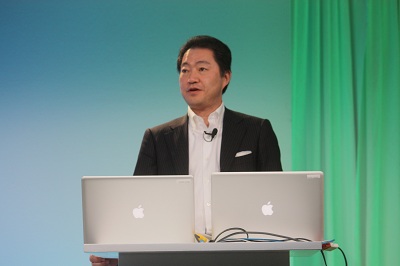
Google has provided the platform to allow games to run in the Chrome browser and make use of the computers 3D graphics hardware. That makes it possible to run games with high-end console-like graphics in a web browser.
[aditude-amp id="flyingcarpet" targeting='{"env":"staging","page_type":"article","post_id":362877,"post_type":"story","post_chan":"none","tags":null,"ai":false,"category":"none","all_categories":"games,","session":"A"}'][See our video interview with Google’s Eric Kay on the native client technology].
Square Enix chief executive Yoichi Wada attended the event at the GooglePlex headquarters in Mountain View, Calif., and said his company has been waiting for this day for a long time. The company created a version of its Mini Ninjas game for Chrome as a “native client” game.
“Let us begin this new era together,” Wada said. “Google’s native client will be welcomed worldwide as a truly innovative technology for the information technology industry and game industry as well.”
He said that high-end games require high-end hardware, but by making those games available on the web via native client, a wider audience will be able to enjoy them. To date, web browsers have been too weak to run games well.
“Google’s native client solves this problem,” he said. “It is an excellent solution for browser gaming.”
A dozen other game companies were at the event to show their support for the Chrome native client. They said the benefits of running a game natively in the Chrome browser is high performance, security, and the ability to port to the system easily. The games include Bastion, an award-winning title from Super Giant Gamesthat debuted on Xbox Live on the Xbox 360 game console.
Google said it would be easy to port existing PC and console games to the Chrome native client, partly because developers can use a varity of familiar programming tools. The Unity 3D game engine will now include a check box that a developer can click in order to make a Unity-based game run on the Chrome browser. That’s pretty darn simple. It means developers don’t have to waste a lot of time rewriting games and other apps for the web, only to see them crawl in slow motion. Besides games, photo and video apps will also benefit from the native client technology.
For game developers, this is a chance for a much wider audience, as Chrome has been downloaded more than 200 million times. Unity reaches 90 million gamers. Oren Tversky, vice president of business development at Unity, said that the experience is much easier for consumers, who don’t have to wait for a long installation. They are less likely to quit a long download and so they are more likely to become paying customers.
[aditude-amp id="medium1" targeting='{"env":"staging","page_type":"article","post_id":362877,"post_type":"story","post_chan":"none","tags":null,"ai":false,"category":"none","all_categories":"games,","session":"A"}']
Five Unity-based games will be available in the Chrome web store. Google is working on improving portability for future operating systems and architectures. It will add features such as support for gamepads, memory mapped files, and web sockets as well.
“These examples show the support for the native client,” said Christian Stevanson, Google product manager for native client. “Games are a category that push the boundaries of what is possible on a platform.”
Ian Ellison Taylor of Google said that the project started three years ago with the question, “What if we could run native code inside the browser, but have it be secure and portable?”
